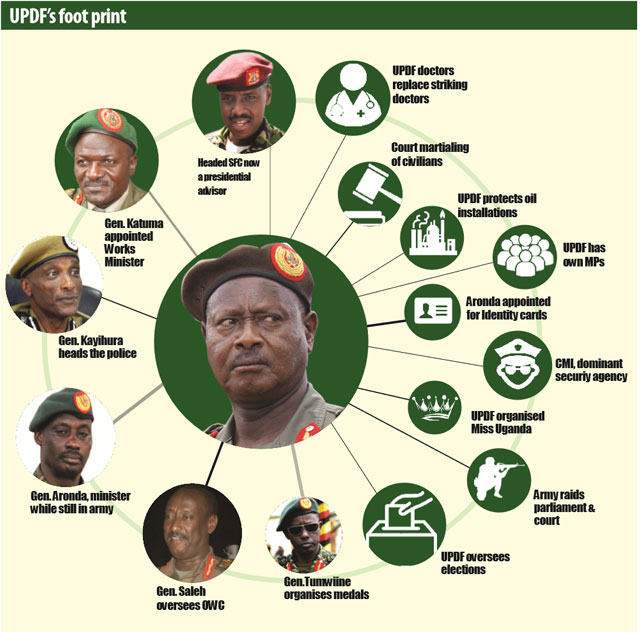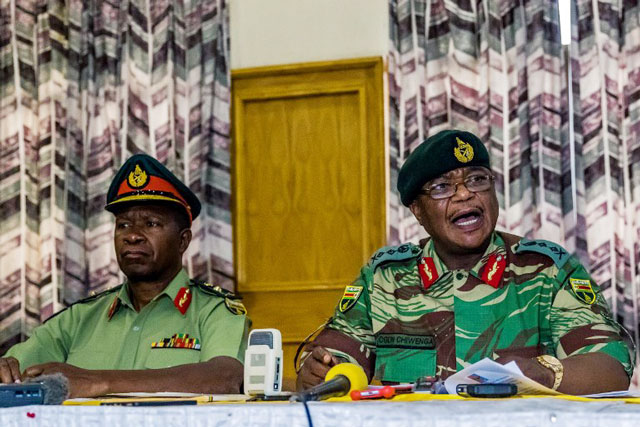
Museveni and the army: Failing to learn from past mistakes?
Kampala, Uganda | HAGGAI MATSIKO | If a position is operationally strategic, President Yoweri Museveni will appoint a soldier to it. If a job is critical to his survival in power, Museveni will appoint a soldier to do it.
As a result, the military today has permanent representation in parliament, heads the police, deploys heavily during elections, protects all the key strategic installations, and has `attaches’ or spies in key ministries, among others. And Museveni is piling on the militarisation of the state.
Between September and November, Museveni has deployed military doctors to replace striking doctors, has commanded military operatives to raid parliament and forcefully ejected legislators opposed to his quest to lift the constitutional age limit, and has made the intelligence arm of the military—the Chieftaincy of Military Intelligence (CMI)—the most dominant security agency.
Looking at these incidents, Maj. Gen Benon Biraaro, the highly respected former presidential candidate in 2016 warns that Uganda “could have its Zimbabwe moment” as resentment mounts.
Gen. Biraro was referring to moves by the military in Zimbabwe to kick out the 93-year old President Robert Mugabe.
Mugabe is the third longest serving president in the world and Museveni is the fifth. Like Museveni, the Zimbabwean leader captured power in 1980 as a guerrilla war hero. But years of one-man misrule that heavily depended on the security forces have eroded the lustre of liberation heroism.
Mugabe is now seen as a senile old figurehead of a bunch of arrogant looters of the state. And his once-trusted army commander, Gen. Constatino Chiwenga, has turned against him. Some observers see similarities with Uganda – at least in the future.
“You are seeing securitisation of the entire state,” says an alarmed Norbert Mao; president of Uganda’s oldest political party, Democratic Party (DP), “it is aimed at comprehensive capture of the state by one man.”
And, Mao told The Independent in an interview: “this trend will intensify until it backfires.”

Interestingly, these events are occurring soon after a book titled `Militarism and the Dilemma of Post-Colonial Statehood: The Case of Museveni’s Uganda’ was released.
In the book, the authors; Busingye Kabumba, Dan Ngabirano and Timothy Kyepa, show that since colonial times, governments in Uganda have relied on the military and that the military nature of the country’s formation and political history—the reason Museveni’s government, ushered in by the military, has been no different.
Do they imply that there could be a coup against Museveni?
If so, then Museveni thinks people who harbor such thoughts are mistaken. He appears confident about his control of the army although concerns have always existed about his involving the army in politics and every day running of the state.
On January 27, 2013, while addressing a judges’ conference in Entebbe, Museveni scoffed at “idiots” who say that the NRM government can be overthrown by arms.
“Some of these people are just idiots…,” the president said, “Uganda government; to overthrow it? Oooooh! You don’t know what you are talking about. The NRM government to overthrow it with arms; but that is our specialty!”
Some scholars have even said that Museveni’s confidence in the army makes him appear as a bad student of Uganda’s political history.
All eight governments in Uganda, except two, since independence in 1962 have been over-thrown in a military coup. This has made Uganda the most coup-prone country in the region; with an average of a coup for every six years, before Museveni came to power in 1986 following a guerrilla war.
Interestingly, the late former President Milton Obote, who was twice overthrown by the army, had similar confidence regarding his government’s insusceptibility to a military coup.
Writing in 1968 in his ‘Myths and Realities: Letter to a London Friend’, Obote had bragged: “As regards the position of the Ugandan army, I am perhaps the only African leader who is not afraid of a military take over.”
At the time, Obote like Museveni today, had beaten the opposition and thought he had outmaneuvered opponents both in the army and his party, the Uganda Peoples Congress. But barely three years later, Idi Amin, an army officer Obote had groomed and put in charge, overthrew him.
 The Independent Uganda: You get the Truth we Pay the Price
The Independent Uganda: You get the Truth we Pay the Price



From the beginning Museveni was an accomplished communist. He still is because whatever he does is in line with Machiavellian doctrine. He mastered the art of war of communist China.
Everything military that he does hinges on a Rwanda factor. Among the decorated and celebrated war heroes of Kabamba attack on Feb 6 1981were the likes of Paul Kagame now president of Rwanda, the late Rwigyema and others. They held prominent leadership positions in Uganda ‘s security apparatus. Today, even as Kagame and company left for dear homeland it is not clear how many were left behind and why.
Museveni’s hold on Uganda has everything to do with Rwanda’s hold on Uganda, security wise and economically.A diehard communist who has conquered territory in some other land is not about to just give up the opportunity accorded to him. This is what lies behind all the manipulation being witnessed.
He has been propping up Raila in Kenya in the hope of of getting Kenya support for taking up EA presidency. No wonder, Raila in Museveni footsteps has started an NRM wing in Kenya.
Museveni’s desired goal is either life presidency in Uganda or EA presidency. On the sidelines he sponsors Rwanda expansion into DRC. It is now up to Ugandans to grant him his wish.